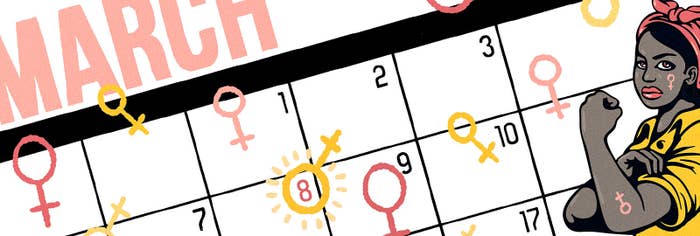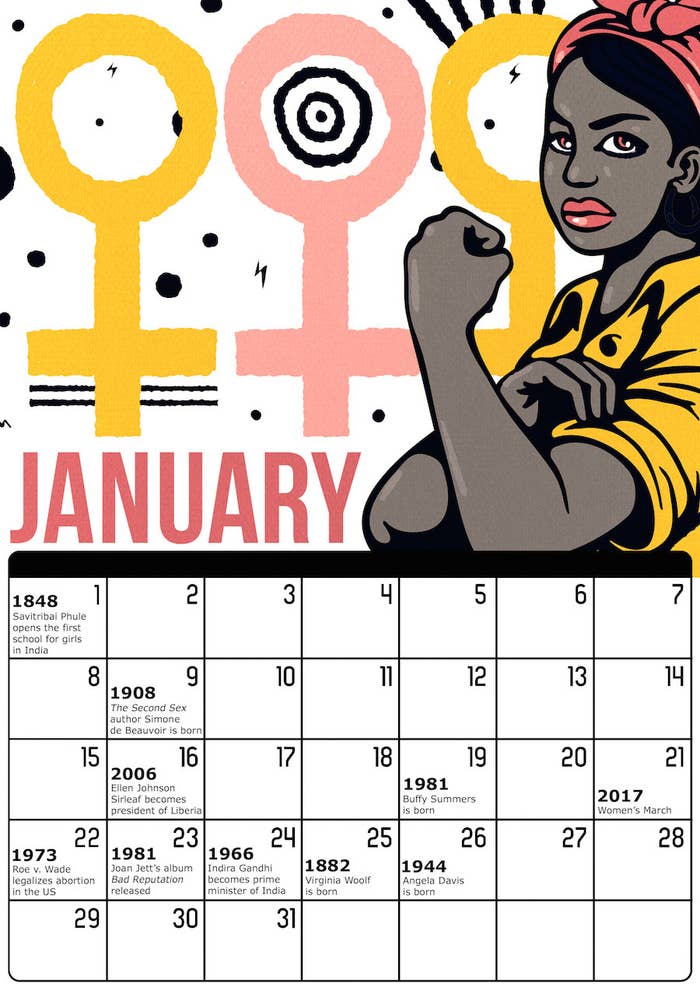March is Women's History Month in the US, and March 8 is International Women's Day.

But is a single day or month each year really enough to note the progress we've made on women's rights, highlight where things are still unequal, and celebrate all the trailblazing women who've left their mark on the world? Nope.
So here's a collection of dates to celebrate women all year round: birthdays, important "firsts," books, films and fictional heroines that changed the way women are portrayed in society, and much more.

All the dates are in the calendar, which you can download here. (Note: It's meant to be an evergreen collection, not a 2017-specific calendar, so you'll want to keep your appointments somewhere else.)
We see this as a starting point, not a definitive resource. There are blank spaces you can use to add in women we missed and dates that are personally significant for you or the people you love.
What other women in history inspire you? What dates make you want to celebrate equality and women's rights? Tell us in the comments!
Here's a preview of some of the dates featured each month. You can see the full list here and save it to refer to throughout the year.

January 16, 2006: Ellen Johnson Sirleaf becomes president of Liberia. She was the first female democratically elected leader of an African country and went on to receive the Nobel Peace Prize in 2011.
January 19, 1981: Buffy Summers, aka Buffy the Vampire Slayer, is born. Yes, she's a fictional character, but even TV heroines have birthdays. And for many women, Buffy was a symbol of female empowerment.
January 22, 1973: The Roe v. Wade ruling by the US Supreme Court legalizes abortion in the United States.

February 11, 1916: Flo Kennedy is born. In 1951, she became one of the first black women to graduate from Columbia Law School, and went on to represent the Black Panthers, sue the Roman Catholic Church over abortion, and found the Feminist Party in 1971. She called herself "radicalism's rudest mouth."
February 19, 1963: The Feminine Mystique is published, addressing what its author Betty Friedan called "the problem with no name": the uneasiness and sadness experienced by (primarily white, middle-class, suburban) housewives. The book is considered one of the starting elements of second-wave feminism, though it isn't without its flaws.
February 27, 1922: Two years after the ratification of the 19th Amendment, the US Supreme Court upholds women's right to vote.

March 1, 1987: The US Congress designates March Women's History Month.
March 8, 1917: Russian women strike "for bread and peace," sparking the Russian revolution. March 8 is also International Women's Day, not "women's day," as some call it. ¯\_(ツ)_/¯ It was first observed in 1911.
March 22, 1913: Sabiha Gökçen is born. She was the first female combat pilot in Turkey and one of the first in the world.
March 24, 2002: Halle Berry becomes the first black woman to win the Academy Award for Best Actress for her role in Monster's Ball. Her achievement came 62 years after Hattie McDaniel, the first black Oscar winner, collected her award in a segregated hotel.
March 27, 2017: The first Muslim Women’s Day, organized by website MuslimGirl, is celebrated online to highlight the achievements of Muslim women.

April 7, 1805: Sacagawea, a Shoshone woman from what is now Idaho, begins interpreting on the Lewis and Clark Expedition. She'd given birth to her son Baptiste just two months before.
April 9, 2009: Parks and Recreation premieres on NBC. Amy Poehler plays the very feminist small-town official Leslie Knope, who knows EXACTLY how to deal with male chauvinists.
April 19, 1966: Roberta "Bobbi" Gibb became the first woman to run the Boston Marathon. After the organizers rejected her application on the grounds that "women are not physiologically able to run a marathon," Gibb showed up anyway, wearing a bathing suit under her shorts, since sports bras were not then available. The Boston Marathon remained officially closed to women until 1972.

May 10, 1872: Thirty-three-year-old Victoria Woodhull becomes the first woman candidate nominated for US president, running for the Equal Rights Party. Her running mate was ~technically~ Frederick Douglass, but he didn't actually consent to be on the ticket and campaigned for Ulysses S. Grant.
May 6, 1981: Twenty-one-year-old architecture student Maya Lin wins a nationwide competition for her design of the Vietnam Veterans Memorial. (She got a B for her design in class, but beat out her professor, who also entered the contest.)
May 17: International Day Against Homophobia, Transphobia and Biphobia, or IDAHOT for short. Why this particular date? On May 17, 1990 the World Health Organization removed homosexuality from its list of mental disorders.
May 29, 1851: Former slave, abolitionist, and feminist Sojourner Truth delivers her famous "Ain't I a Woman?" speech, which includes the lines: "If de fust woman God ever made was strong enough to turn de world upside down all alone, dese women togedder ought to be able to turn it back, and get it right side up again! And now dey is asking to do it, de men better let 'em."

June 5, 1646: Elena Cornaro Piscopia is born in Venice, Italy. In 1678 she became the first woman in the world to receive a doctorate, which she earned in philosophy (after being prohibited from taking the doctor of theology degree due to her gender).
June 9, 2014: Laverne Cox, who plays Sophia Burset on the series Orange Is the New Black, becomes the first trans woman to appear on the cover of Time magazine.
June 18, 1858: Rani Lakshmibai, the queen of Jhansi state in northern India, dies in battle fighting the British, with her young son strapped to her back.
June 26, 1945: The United Nations Charter, signed in San Francisco, recognizes the principle of equality between men and women.

July 2, 1951: Trans activist Sylvia Rivera is born in New York. She fought for the inclusion of trans and gender-diverse people within the LGBT rights movement, and is known for her famous quote, "Hell hath no fury like a drag queen scorned," among many other things. She died in 2002.
July 15, 1907: Chinese feminist, poet, and educator Qiu Jin is executed for plotting to overthrow the Qing dynasty. As she wrote, “Don’t tell me women / are not the stuff of heroes," and today she's celebrated as a national hero in China.
July 18, 1995: Tejano music superstar Selena's album Dreaming of You is released just months after the 23-year-old singer's murder. She remains an inspiration to fans today, especially the US Latinx community.
July 26, 1990: The Americans With Disabilities Act is signed into law. Women activists were instrumental in its passage, including Patrisha "The General" Wright.

August 1, 1929: Roller derby icon Ann Calvello is born. She was a legend in the sport for her brightly-colored hair, foul mouth, tattoos, and general badassery.
August 6, 2009: Sonia Sotomayor is confirmed as the first Latina justice on the US Supreme Court.
August 11, 2016: 20-year-old Simone Manuel becomes the first black woman to win an Olympic gold medal in an individual swimming event.
August 26, 1970: A nationwide Women's Strike for Equality takes place in the United States, marking the 50th anniversary of women's right to vote.

September 2, 2013: At age 64, Diana Nyad becomes the first person to swim from Cuba to Florida without a protective shark cage. She'd wanted to do it since she was 8 years old, and we're pretty sure the dictionary definition for "goals" is just a picture of her face.
September 5, 1939: Claudette Colvin is born. Though Rosa Parks is celebrated for kicking off the Montgomery bus boycott, Colvin, then just 15 years old, refused to give up her seat nine months before Parks did. In an interview, Colvin said she was inspired by the black history she'd been learning in her segregated school: "It felt like Sojourner Truth was on one side pushing me down, and Harriet Tubman was on the other side of me pushing me down. I couldn't get up."
September 7, 2013: Nova Peris becomes the first Indigenous woman elected to Australia's Senate. Before getting into politics, she was the first Indigenous Australian to win an Olympic gold medal, and the first Australian mom to win one since 1956.
September 19, 1979: Hermione "Badass" Granger is born.

October 9, 1992: Bikini Kill, the riot-grrrl band fronted by Kathleen Hanna, releases its first EP.
October 10, 2014: Pakistani girls education advocate Malala Yousafzai becomes the youngest winner of the Nobel Peace Prize at age 17.
October 16, 1916: Margaret Sanger opens the first US family planning clinic in Brooklyn, New York. (It was raided by the police 10 days later.) Sanger went on to found Planned Parenthood.
October 24, 1975: Ninety percent of Icelandic women participate in a general strike called "Women's Day Off." They did it again in 2008, and on October 24, 2016.

November 1, 1848: The first medical school for women opens in Boston. (Elizabeth Blackwell, the first woman to earn a medical degree in the US, had been accepted to an all-male institution the year before ~as a joke~.)
November 6, 2012: Mazie Hirono is elected the first Asian-American female Senator, representing Hawaii. Hirono immigrated from Japan as a young child.
November 10, 1236: Razia Sultana becomes the first female ruler of the Muslim kingdom of Delhi Sultanate.
November 20, 2015: Carol, a same-sex love story based on a 1952 novel by Patricia Highsmith, is released in US theaters. Notably, the two lead characters, played by Cate Blanchett and Rooney Mara, manage to avoid "Dead Lesbian Syndrome."

December 6, 1927: Patsy Takemoto Mink is born in Hawaii. She was the first Japanese-American woman and the first woman of color elected to Congress, beginning her first term in the House of Representatives in 1965. She was also instrumental in passing Title IX.
December 12, 2015: Women in Saudi Arabia vote for the first time.
December 14, 1985: Wilma Mankiller becomes the first female chief of the Cherokee Nation.
December 16, 1775: English novelist Jane Austen is born. She wrote in Pride and Prejudice: "There is a stubbornness about me that never can bear to be frightened at the will of others. My courage always rises at every attempt to intimidate me." Words to live by.
This post was adapted from French, and the English version is inspired by many sources, including Today in Women's History (Saints, Sisters, and Sluts) and the National Women's History Project.